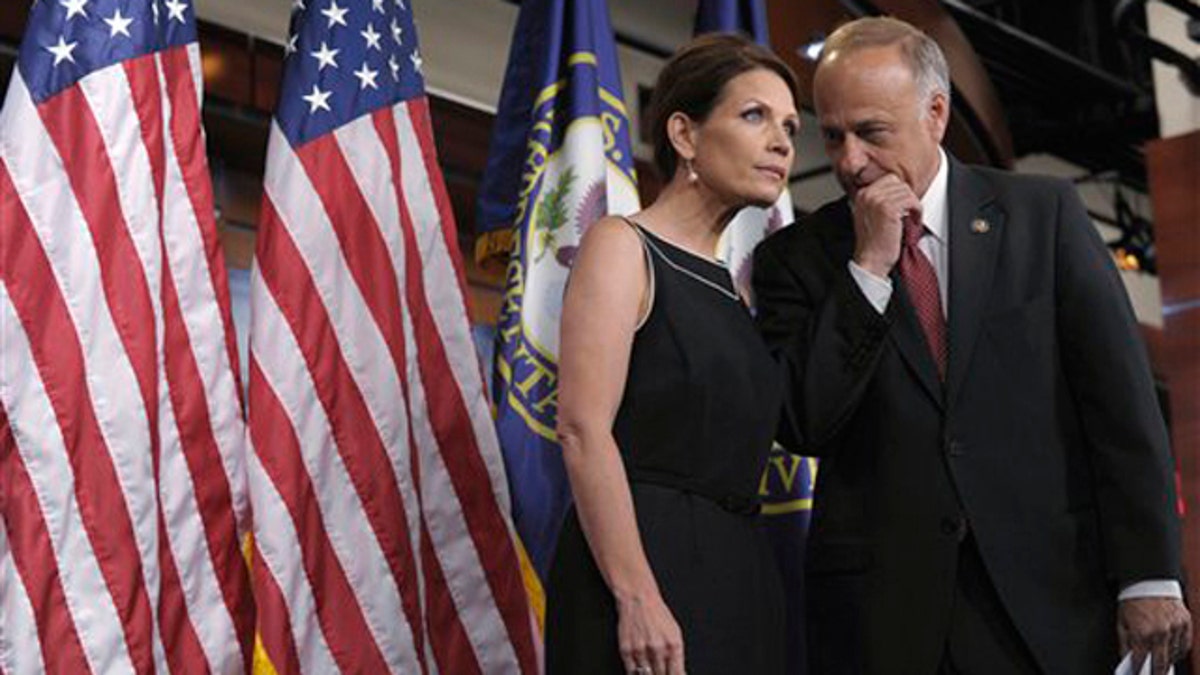
Wednesday: Rep. Michele Bachmann speaks with Rep. Steve King during a news conference on Capitol Hill. (AP)
Three Republican lawmakers on Wednesday introduced a bill urging the White House to prioritize who gets paid first if Washington fails to raise the debt ceiling by the Aug. 2 deadline set by the Obama administration.
Though Treasury officials claimed earlier this year they could not prioritize payments, the White House is now talking openly about making "choices" regarding which bills to pay. If Congress does not permit an increase in the debt ceiling, Washington will face a reality familiar to any family that has maxed out the household credit card -- essential bills will have to be paid using funds that would have otherwise gone to luxuries like restaurant meals and movie tickets.
The task of determining what is a luxury and what is an essential payment is a difficult one. The bill introduced Wednesday by Rep. Steve King, R-Iowa, sets two top-tier priorities -- the proposal would mandate the government take care of its debt payments and military salaries before anything else.
"There's money that comes in, there's revenue that comes in. ... And of that, we want to make sure that we keep our promises," King said. "We pay our military first because they're the ones that protect the security and the liberty of the American people. ... Their lives are on the line."
King, joined by presidential candidate Rep. Michele Bachmann, R-Minn., and Rep. Louie Gohmert, R-Texas, suggested the administration has more leeway than it's letting on to prioritize other important payments. King claimed that Medicare, Medicaid and Social Security payments could still go out, at least in the short-term, if those payments are prioritized. King told Fox News that President Obama is trying to "scare seniors" by suggesting Social Security checks might not go out.
The White House acknowledged again Wednesday that it would have to make choices, while describing those choices as "heinous" and hardly a workable solution.
"When you have $1 in obligations and you only have 60 cents in your pockets, you've got to borrow 40 cents in order to meet those obligations -- and your authority to borrow that 40 cents has been eliminated, you are then in a box. And you have to make choices about how and where to apply the 60 cents you have in your pocket," White House Press Secretary Jay Carney said in a statement.
Carney repeatedly said he doesn't think the government will be in that situation because Congress will ultimately "do the right thing."
But he and Obama warned that vital payments like Social Security checks would be in very real jeopardy if the cap is not raised.
"We have obligations that exceed the money we take in ... and that would then entail a kind of Sophie's choice situation where you have to decide what bills you can pay," Carney said Tuesday. "And the fact is that whether it's Social Security checks or veterans' benefits or disability benefits ... it's pretty clear that the effect will be significant. And so, no, we can't guarantee, if there were a default, any specific bill will be paid."
Addressing concerns that Social Security recipients could be left high and dry by the lack of a debt deal, Sen. Bill Nelson, the Democratic senator up for re-election in 2012 in the senior-rich state of Florida, proposed passing a temporary law -- as was done in 1996 -- that takes Social Security off the books when calculating the debt limit.
"Would such a non-traditional measure be needed today? Would pending legislation that prioritizes Social Security obligations suffice? If not, I stand ready with legislation that would temporarily exempt Social Security obligations from the public debt limit," Nelson wrote in a letter to Treasury Secretary Tim Geithner.
Congressional Research Service studies have said that either the Treasury or the White House budget office could make strategic decisions about what bills to pay if borrowing authority is exhausted. However, CRS said these last-resort measures would only work for so long without a debt-ceiling increase.
One report earlier this year said the government would probably have to assume $738 billion in debt above the current limit to finance operations for the rest of the year. According to CRS, to cover that would take a complete elimination of discretionary spending in that period, or a 70 percent cut from entitlements or a two-thirds tax increase -- or some combination of those options.
The debate over priorities and the debt limit comes as new numbers released by the Treasury Department on Wednesday showed that the annual deficit hit $971 billion for the first nine months of fiscal year 2011, which ends Sept. 30.
The deficit fell short of hitting a $1 trillion deficit through June in part due to a one-time reduction of $30 billion in estimated costs for federal education loans, Treasury officials said. Without that adjustment and others, the deficit would have been $1.046 trillion for the fiscal year to date.
Officials said the new number does not change Treasury's projection that Aug. 2 is the drop-dead date for the U.S. to risk defaulting on its loans.
The Congressional Budget Office projects the government will record a $1.4 trillion deficit for the entire fiscal year, the third fiscal year of trillion dollar-plus deficits.




